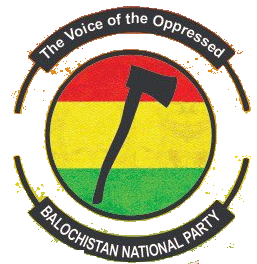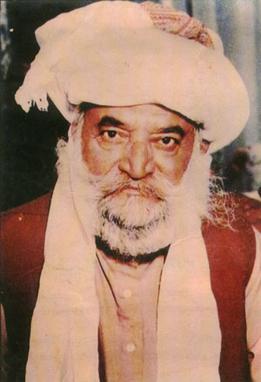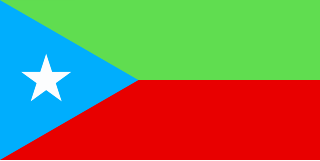
The Baloch or Baluch are a nomadic, pastoral, ethnic group which speaks the Western Iranic Balochi language and is native to the Balochistan region of South and Western Asia, encompassing the countries of Pakistan, Iran, and Afghanistan. There are also Baloch diaspora communities in neighbouring regions, including in Central Asia, and the Arabian Peninsula.

The Balochistan National Party or Balochistan National Party (Mengal) (Urdu: بلوچستان نيشنل پارٹی ; Balūcistān Nēśanal Pārtī ) is a political party in Balochistan, Pakistan. BNP believes in more provincial rights and greater autonomy for Baluchistan province through peaceful and democratic struggle.

Nawab Akbar Shahbaz Khan Bugti was a Pakistani politician and the Tumandar (head) of the Bugti tribe of Baloch people who served as the Minister of State for Interior and Governor of Balochistan Province in Pakistan. He also became minister of state for defence in the cabinet of Feroz Khan Noon. Earlier, he had also served as the Minister of State for Interior.

The Wali Khan faction of the National Awami Party was formed after the 1967 split in the original NAP between Maulana Bhashani and Abdul Wali Khan. The Wali Khan faction was later named National Awami Party (NAP) after the independence of Bangladesh.
Mazari is a Baloch tribe in Pakistan. Mazari is derived from the Balochi word mazar, which means "Tiger" in the Balochi language. Rojhan-Mazari, a town in the Rajanpur District of the Punjab near the inter-provincial borders of Balochistan, Sindh and Punjab, is the stronghold and the headquarter of Mazari tribe.

Ghaus Bakhsh Bizenjo was a Pakistani politician from Balochistan. He served as the 3rd Governor of Balochistan.

The Insurgency in Balochistan is an insurgency or revolt by Baloch separatist insurgents and various Islamist militant groups against the governments of Pakistan and Iran in the Balochistan region, which covers the Pakistani province of Balochistan, Iranian province of Sistan and Baluchestan, and Balochistan of southern Afghanistan. Rich in natural resources, this is the largest, least populated and least developed province in Pakistan and Iran, and armed groups demand greater control of the province's natural resources and political autonomy. Baloch separatists have attacked civilians from other ethnicities throughout the province. In the 2010s, attacks against the Shia community by sectarian groups—though not always directly related to the political struggle—have risen, contributing to tensions in Balochistan. In Pakistan, the ethnic separatist insurgency is low-scale but ongoing mainly in southern Balochistan, as well as sectarian and religiously motivated militancy concentrated mainly in northern and central Balochistan.
Brahamdagh Khan Bugti or Brahumdagh Khan Bugti is the founder and leader of the Political Organisation Baloch Republican Party, a Baloch nationalist group which broke away from his uncle Talal Akbar Bugti's Jamhoori Watan Party in 2008. He is the grandson and tribal successor of Nawab Akbar Bugti, former chief minister and governor of the Balochistan province. He campaigns for the rights of Baloch people around Europe. As of 2018, he was living in self-imposed exile in Switzerland.
The Hyderabad tribunal (1975–1979), also known as Hyderabad conspiracy case, is the name of a former judicial tribunal used in Pakistan to prosecute opposition politicians of the National Awami Party on the charges of treason and acting against the ideology of Pakistan.
The Baloch Students Organization is a student organisation that campaigns for the students of Pakistan's Balochistan Province. It was founded as a student movement on 26 November 1967 in Karachi and remains the largest ethnic Baloch student body in the country. It got divided due to ideological differences. BSO Pajjar and BSO Mohiuddin are affiliated with the parliamentary framework of Pakistan. Dr Allah Nazar, founder of pro independence wing, in 2002 while he was studying in college, created a breakaway faction — BSO–Azad — that advocated struggle for an independent Balochistan based on pre-colonial Baloch country. The Pakistani government banned the BSO Azad on 15 March 2013, as a terrorist organisation.
Jumma Khan Marri is a senior Baloch political activist from Balochistan. He was formerly a member of Baloch separatist groups.

Sher Mohammad Marri was the chief of the Marri Baloch tribe in Pakistan, and an early leader in the Parrari movement which would lead to the formation of the Baloch Liberation Army, a militant nationalist group. A Marxist, he had close ties to leftist governments in Kabul and Moscow.
Abdul Raziq Bugti was a Pakistani politician from Balochistan province.
Talal Akbar Bugti was a Pakistani politician and a Baloch tribal leader of the Bugti tribe in Balochistan. He served as the President of the Jamhoori Watan Party from 2006 until his death in 2015.

Gul Khan Naseer also known as Malek o-Sho'arā Balochistan ; 14 May 1914 – 6 December 1983) was a Pakistani politician, poet, historian, and journalist from Balochistan. Most of his work is in Balochi language, but he also wrote in English, Urdu, Brahui and Persian.

Balach Marri was a Baloch commander in the Balochistan Liberation Army (BLA), a Baloch nationalist organisation, listed as a terrorist group by Pakistan, China, the United Kingdom, the United States and the European Union.

Hyrbyair Marri is an activist from Balochistan, Pakistan and president of the Free Balochistan Movement.
Nawab Changez (Jangayz) Khan Marri is the Nawab of the Marri Baloch people in Pakistan. He is currently serving as a member of the Provincial Assembly of Balochistan since February 2024. He has served as Balochistan's Irrigation and Energy Minister from 2013 to 2018. He has also served as Balochistan's Communication Minister In the cabinet of Zulfiqar Ali Khan Magsi from 1993 to 1997.

Mehran Marri is a British-Pakistani Baloch separatist and militant leader, currently serving as the head of United Baloch Army (UBA), a militant organization which is designated as a terrorist organisation by Pakistan and Switzerland.

United Baloch Army was a militant group, fighting for the separation of Balochistan. The group has been designated as a terrorist organisation by the Pakistani government. The government of Pakistan banned the group on 15 March 2013. The group has also been classified as a terrorist organisation by Switzerland's government.












